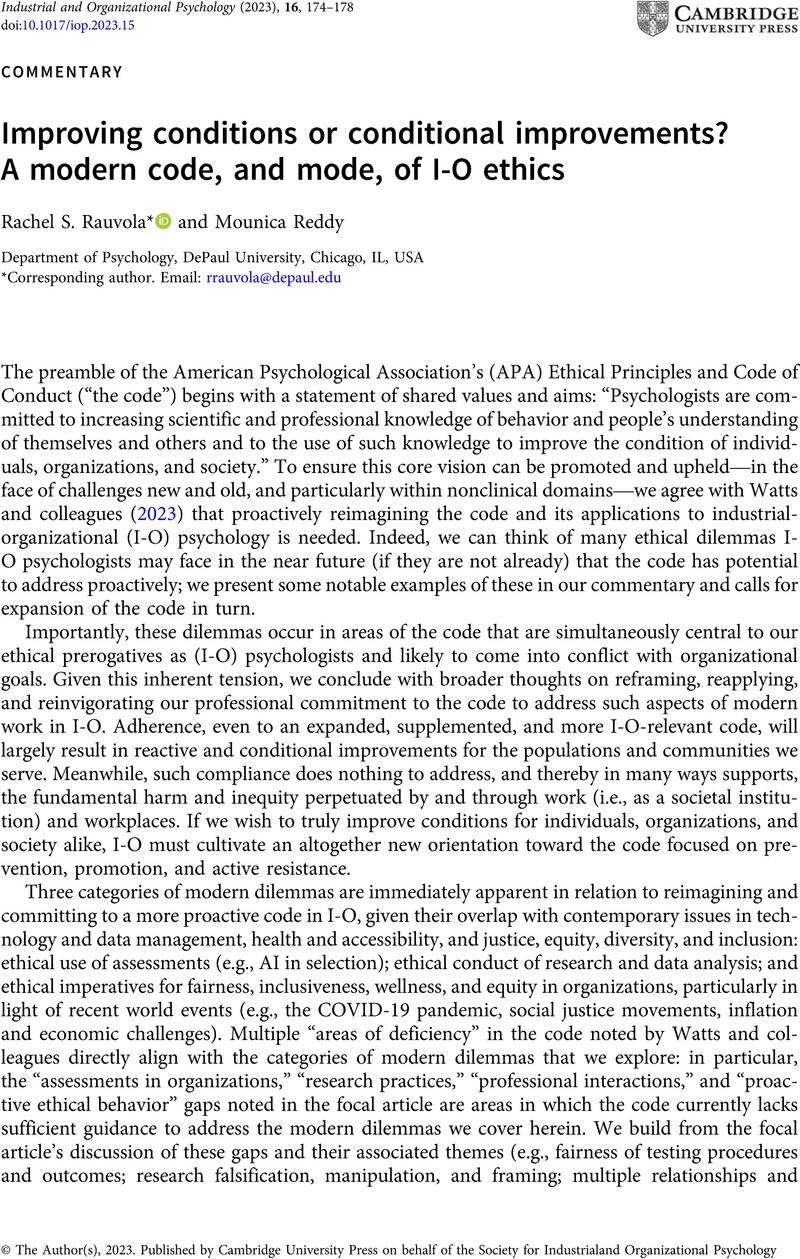No CrossRef data available.
Article contents
Improving conditions or conditional improvements? A modern code, and mode, of I-O ethics
Published online by Cambridge University Press: 09 May 2023
Abstract
An abstract is not available for this content so a preview has been provided. Please use the Get access link above for information on how to access this content.

- Type
- Commentaries
- Information
- Copyright
- © The Author(s), 2023. Published by Cambridge University Press on behalf of the Society for Industrial and Organizational Psychology
References
Andrea, S. B., Eisenberg-Guyot, J., Oddo, V. M., Peckham, T., Jacoby, D., & Hajat, A. (2022). Beyond hours worked and dollars earned: multidimensional EQ, retirement trajectories and health in later life. Work, Aging and Retirement, 8, 51–73. doi: 10.1093/workar/waab012
CrossRefGoogle ScholarPubMed
Banks, G. C., Rogelberg, S. G., Woznyj, H. M., Landis, R. S., & Rupp, D. E. (2016). Evidence on questionable research practices: the good, the bad, and the ugly. Journal of Business and Psychology, 31, 323–338. doi: 10.1007/s10869-016-9456-7
CrossRefGoogle Scholar
Bell, E., & Wray-Bliss, E. (2009). Research ethics: Regulations and responsibilities. In Buchanan, D. & Bryman, A. (Eds.), The SAGE handbook of organizational research methods (pp. 78–92). SAGE.Google Scholar
Bergman, M. E. (2019). Civility, anti-racism, and inclusion. Industrial and Organizational Psychology: Perspectives on Science and Practice, 12, 412–418. doi: 10.1017/iop.2019.80
CrossRefGoogle Scholar
Buchanan, D. A., & Bryman, A. (2009). The organizational research context: Properties and implications. In Buchanan, D. & Bryman, A. (Eds.), The SAGE handbook of organizational research methods (pp. 1–18). SAGE.Google Scholar
Greenwood, M. (2016). Approving or improving research ethics in management journals. Journal of Business Ethics, 137, 507–520. doi: 10.1007/s10551-015-2564-x
CrossRefGoogle Scholar
Griffin, M. A., Neal, A., & Parker, S. K. (2007). A new model of work role performance: positive behavior in uncertain and interdependent contexts. Academy of Management Journal, 50, 327–347. doi: 10.5465/amj.2007.24634438
CrossRefGoogle Scholar
Hage, S. M., & Kenny, M. E. (2009). Promoting a social justice approach to prevention: future directions for training, practice, and research. Journal of Primary Prevention, 30, 75–87. doi: 10.1007/s10935-008-0165-5
CrossRefGoogle ScholarPubMed
Hinkin, T. R., & Holtom, B. C. (2009). Response rates and sample representativeness: Identifying contextual response drivers. In Buchanan, D. & Bryman, A. (Eds.), The SAGE handbook of organizational research methods (pp. 451–464). SAGE.Google Scholar
Lefkowitz, J. (2008). To prosper, organizational psychology should…expand the values of organizational psychology to match the quality of its ethics. Journal of Organizational Behavior, 29, 439–453. doi: 10.1002/job.527
CrossRefGoogle Scholar
Parker, S. K., Bindl, U. K., & Strauss, K. (2010). Making things happen: a model of proactive motivation. Journal of Management, 36, 827–856. doi: 10.1177/0149206310363732
CrossRefGoogle Scholar
Rabelo, V. C., & Cortina, L. M. (2016). Intersectionality: Infusing IO psychology with feminist thought. In Roberts, T.-A., Curtin, N., Duncan, L. E., & Cortina, L. M. (Eds.), Feminist perspectives on building a better psychological science of gender (pp. 179–197). Springer. https://doi.org/10.1007/978-3-319-32141-7_11
CrossRefGoogle Scholar
Tay, L., Woo, S. E., Hickman, L., Booth, B. M., & D’Mello, S. (2022). A conceptual framework for investigating and mitigating machine-learning measurement bias (MLMB) in psychological assessment. Advances in Methods and Practices in Psychological Science, 5. doi: 10.1177/25152459211061337
CrossRefGoogle Scholar
Tippins, N. T., Oswald, F. L., & McPhail, S. M. (2021). Scientific, legal, and ethical concerns about AI-based personnel selection tools: a call to action. Personnel Assessment and Decisions, 7, 1. doi: 10.25035/pad.2021.02.001
CrossRefGoogle Scholar
van Dijk, H., Kooij, D., Karanika-Murray, M., De Vos, A., & Meyer, B. (2020). Meritocracy a myth? A multilevel perspective of how social inequality accumulates through work. Organizational Psychology Review, 10, 240–269. doi: 10.1177/2041386620930063
CrossRefGoogle Scholar
Watts, L. L., Lefkowitz, J., Gonzalez, M. F., & Nandi, S. (2023). How relevant is the APA ethics code to industrial-organizational psychology? Applicability, deficiencies, and recommendations. Industrial and Organizational Psychology: Perspectives on Science and Practice, 16(3).Google Scholar
Wax, A. (2014). Putting the “ability” back into “disability.” Industrial and Organizational Psychology: Perspectives on Science and Practice, 7, 253–255. doi: 10.1111/iops.12143
CrossRefGoogle Scholar


